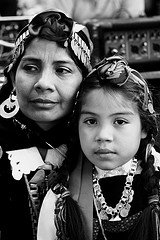
Monuments, Empires and Resistance wins Society of American Archaeology book award
Chilean natives resisted Spanish conquest for more than 300 yearsFrom Vanderbilt University:
Anthropologist Tom D. Dillehay's book Monuments, Empires and Resistance has received the Society of American Archaeology's highest book award for 2008.Image credit: Patricio Valenzuela. Licensed under Creative Commons.
In the book, Dillehay, who is the Distinguished Professor of Anthropology at Vanderbilt University, examines the methods that the Araucanian people of southern Chile used to resist Spanish dominance for more than 300 years.
In 1550, when the Conquistador Pedro de Valdivia attempted to conquer southern Chile, he ran into stiff opposition from the scattered population of the Araucanians who had successfully resisted Incan conquest. Before disease and fighting reduced their numbers, the Araucanians earned the nickname of the Apache of South America by defeating Valdivia and his followers and nearly capturing Santiago. Subsequently, the Spanish pushed the resisters into a forest region south of the Bio-Bio River, which remained the boundary between the two peoples for three centuries. It wasn't until the late 1800's that the Chilean army defeated the Araucanians and settled them on reservations farther to the south.
Dillehay's book draws on 30 years of anthropological, archaeological and archival research to investigate the manner in which the Araucanians successfully resisted the Spanish and actually flourished in the process, including their use of sacred monuments to help form widespread alliances and adoption of the use of horses in battle.

No comments:
Post a Comment